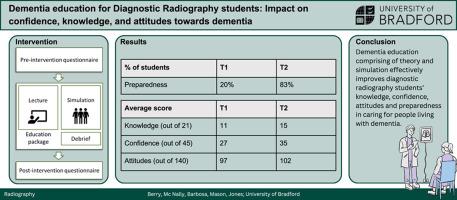Dementia education for Diagnostic Radiography students: Impact on confidence, knowledge, and attitudes towards dementia
IF 2.5
Q2 RADIOLOGY, NUCLEAR MEDICINE & MEDICAL IMAGING
引用次数: 0
Abstract
Introduction
Diagnostic radiographers play a key role in the healthcare of people living with dementia, capturing and producing diagnostic images in a range of settings. Diagnostic radiographers often lack the confidence and skills to assess people with dementia appropriately, and people with dementia often report negative experiences within imaging departments. There is a lack of radiography-specific dementia education within pre-registration programmes in the UK so newly qualified radiographers enter the workforce unprepared. The aim of this study was to evaluate the impact of a co-produced dementia education programme on student radiographers’ preparedness to care, knowledge, confidence and attitudes towards dementia.
Methods
A 3-hour co-produced dementia education was delivered and evaluated using a pre-test-post-test design. A single self-administered questionnaire, comprising validated instruments, was used to assess second-year radiography students' knowledge, confidence and attitudes towards dementia. Wilcoxon signed-rank test was used to compare scale scores before and after the education.
Results
Participants knowledge, confidence and preparedness to care for people with dementia significantly increased following the intervention. Attitudes were also more positive post-intervention. Participants reported that they found the education valuable.
Conclusions
Dementia education comprising of taught theory and simulation-based education, co-produced with experts by experience, effectively improves diagnostic radiography students’ knowledge, confidence and attitudes in caring for people living with dementia.
Implications for practice
Combined theory and practice-based dementia education should be included in undergraduate diagnostic radiography curriculums.

针对放射诊断专业学生的痴呆症教育:对痴呆症的信心、知识和态度的影响。
简介放射诊断技师在痴呆症患者的医疗保健中发挥着关键作用,他们在各种环境中采集和制作诊断图像。放射诊断技师往往缺乏对痴呆症患者进行适当评估的信心和技能,而痴呆症患者也经常报告在影像科室的负面经历。在英国,注册前课程中缺乏针对痴呆症的放射学教育,因此新获得资格的放射技师在进入工作岗位时毫无准备。本研究旨在评估共同制作的痴呆症教育课程对放射技师学生的护理准备、知识、信心和对痴呆症的态度的影响:方法: 采用前测-后测的设计方法,对共同制作的 3 小时痴呆症教育课程进行授课和评估。由经过验证的工具组成的单一自填式问卷用于评估二年级放射学学生对痴呆症的知识、信心和态度。采用Wilcoxon符号秩检验比较教育前后的量表得分:结果:干预后,学员对痴呆症患者护理的知识、信心和准备程度均有显著提高。干预后的态度也更加积极。参与者表示他们认为教育很有价值:结论:痴呆症教育包括理论教学和模拟教学,由专家根据经验共同制作,可有效提高放射诊断专业学生在护理痴呆症患者方面的知识、信心和态度:实践启示:以理论和实践为基础的痴呆症教育应纳入放射诊断学本科课程。
本文章由计算机程序翻译,如有差异,请以英文原文为准。
求助全文
约1分钟内获得全文
求助全文
来源期刊

Radiography
RADIOLOGY, NUCLEAR MEDICINE & MEDICAL IMAGING-
CiteScore
4.70
自引率
34.60%
发文量
169
审稿时长
63 days
期刊介绍:
Radiography is an International, English language, peer-reviewed journal of diagnostic imaging and radiation therapy. Radiography is the official professional journal of the College of Radiographers and is published quarterly. Radiography aims to publish the highest quality material, both clinical and scientific, on all aspects of diagnostic imaging and radiation therapy and oncology.
 求助内容:
求助内容: 应助结果提醒方式:
应助结果提醒方式:


